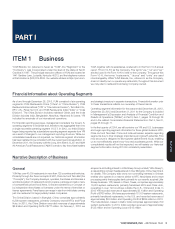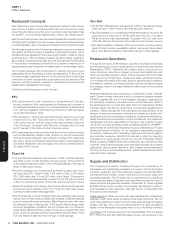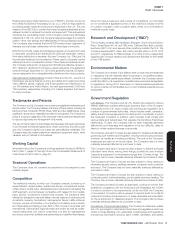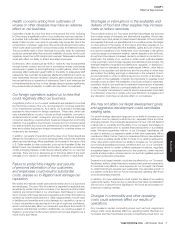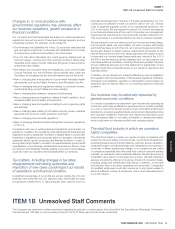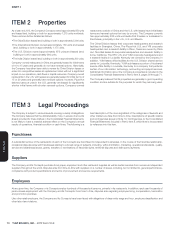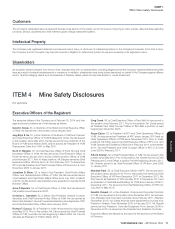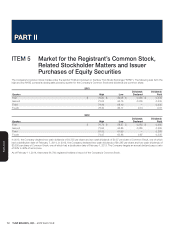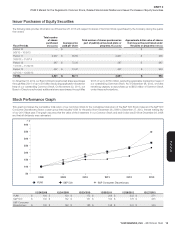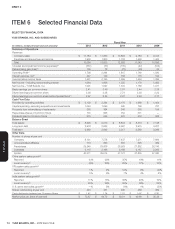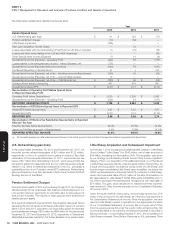Pizza Hut 2013 Annual Report Download - page 104
Download and view the complete annual report
Please find page 104 of the 2013 Pizza Hut annual report below. You can navigate through the pages in the report by either clicking on the pages listed below, or by using the keyword search tool below to find specific information within the annual report.
YUM! BRANDS, INC.-2013 Form10-K8
Form 10-K
PART I
ITEM 1ARisk Factors
ability to pass along commodity price increases to our customers is limited.
Significant increases in gasoline prices could also result in a decrease of
customer traffic at our restaurants or the imposition of fuel surcharges by
our distributors, each of which could adversely affect our profit margins.
Our operating expenses also include employee wages and benefits
and insurance costs (including workers’ compensation, general liability,
property and health) which may increase over time. Any such increase
could adversely affect our profit margins.
Our operating results are closely tied to the
success of our Concepts’ franchisees.
A significant portion of our restaurants are operated by franchisees from
whom we derive a significant portion of our revenues in the form of royalty
payments. As a result, the success of our business depends in part upon
the operational and financial success of our Concepts’ franchisees. We have
limited control over how our Concepts’ franchisees’ businesses are run,
and the inability of our Concepts’ franchisees to operate successfully could
adversely affect our operating results through decreased royalty payments.
If franchisees incur too much debt or if economic or sales trends deteriorate
such that they are unable to operate profitably or repay existing debt, it
could result in financial distress, including insolvency or bankruptcy. If a
significant franchisee or a significant number of our Concepts’ franchisees
become financially distressed, our operating results could be impacted
through reduced or delayed royalty payments or increased rent obligations
for leased properties on which we are contingently liable.
Our success depends substantially on the value
and perception of our brands.
Our success depends in large part upon our ability to maintain and
enhance the value of our brands and our customers’ connection to our
brands. Brand value is based in part on consumer perceptions on a
variety of subjective qualities. Business incidents, whether isolated or
recurring and whether originating from us, our franchisees or suppliers,
can significantly reduce brand value and consumer trust, particularly if the
incidents receive considerable publicity or result in litigation. For example,
our brands could be damaged by claims or perceptions about the quality
or safety of our products or the quality of our suppliers, regardless of
whether such claims or perceptions are true. Any such incident could
cause a decline in consumer confidence in, or the perception of, our
Concepts and/or our products and decrease the value of our brands as
well as consumer demand for our products, which would likely result in
lower revenues and profits.
Our inability or failure to recognize, respond to
and effectively manage the accelerated impact
of social media could materially adversely impact
our business.
There has been a marked increase in the use of social media platforms,
including weblogs (blogs), social media websites, and other forms of
Internet-based communications which allow individuals access to a broad
audience of consumers and other interested persons. Many social media
platforms immediately publish the content their subscribers and participants
post, often without filters or checks on accuracy of the content posted.
Information posted on such platforms at any time may be adverse to our
interests and/or may be inaccurate. The dissemination of information online
could harm our business, prospects, financial condition, and results of
operations, regardless of the information’s accuracy. The harm may be
immediate without affording us an opportunity for redress or correction.
Other risks associated with the use of social media include improper
disclosure of proprietary information, negative comments about our
Concepts, exposure of personally identifiable information, fraud and
out-of-date information. The inappropriate use of social media by our
customers or employees could increase our costs, lead to litigation or
result in negative publicity that could damage our reputation.
A suspension of the Chinese affiliates of the “Big
Four” accounting firms may impact our ability
to access capital markets and could result in
other material adverse effects.
In January 2014, a U.S. administrative law court issued an initial ruling
to suspend Chinese affiliates of the global “Big Four” accounting firms,
including the Chinese affiliate of our independent auditor, from auditing
U.S.-listed companies for six months. While we believe the likelihood of
the suspension becoming effective is remote, it is difficult to determine
the potential consequences if the ruling is sustained. However, given the
significance of our China Division to our consolidated financial statements,
it is possible that we would be unable to include audited and/or reviewed
consolidated financial statements in the Quarterly Reports on Form 10-Q
and Annual Reports on Form 10-K that we are required to file with the
SEC. As a result, we could be unable to file our reports in a timely manner
or such filings would be considered deficient. Until such reviews or audits
are completed, our filings under the Exchange Act could continue to be
deficient or untimely, and our ability to access the capital markets could
be significantly limited. These issues could render us temporarily ineligible
for use of both shelf registration and “short-form” registration that allows
us to incorporate our prior filings by reference. Our inability to satisfy our
reporting obligations as a public company may lead the New York Stock
Exchange to commence delisting procedures with respect to our common
shares. In addition, the failure to deliver audited financial statements could
also constitute an event of default under our Credit Facility. Moreover, any
negative news about the proceedings against the “Big Four” audit firms
could erode investor confidence in financial statements relating to our
Chinese operations.
We could be party to litigation that could
adversely affect us by increasing our expenses
or subjecting us to significant monetary
damages and other remedies.
From time to time we are involved in a number of legal proceedings, which
include consumer, employment, tort, patent, securities, derivative and other
litigation (see the discussion of Legal Proceedings in Note 19 to the consolidated
financial statements included in Item 8 of this Report). We are currently a
defendant in cases containing class action allegations in which the plaintiffs
have brought claims under federal and state wage and hour, disability and other
laws. We are also currently a defendant in securities and derivative lawsuits
alleging inadequate disclosures in violation of federal securities laws. Plaintiffs
in these types of lawsuits often seek recovery of very large or indeterminate
amounts, and the magnitude of the potential loss relating to such lawsuits
may not be accurately estimated. Regardless of whether any claims against
us are valid, or whether we are ultimately held liable, such litigation may be
expensive to defend and may divert resources away from our operations and
negatively impact reported earnings. With respect to insured claims, a judgment
for monetary damages in excess of any insurance coverage could adversely
affect our financial condition or results of operations. Any adverse publicity
resulting from these allegations may also adversely affect our reputation, which
in turn could adversely affect our results.
In addition, the restaurant industry has been subject to claims that relate to
the nutritional content of food products, as well as claims that the menus and
practices of restaurant chains have led to the obesity of some customers. We
may also be subject to this type of claim in the future and, even if we are not,
publicity about these matters (particularly directed at the quick service and
fast-casual segments of the industry) may harm our reputation and adversely
affect our results.







